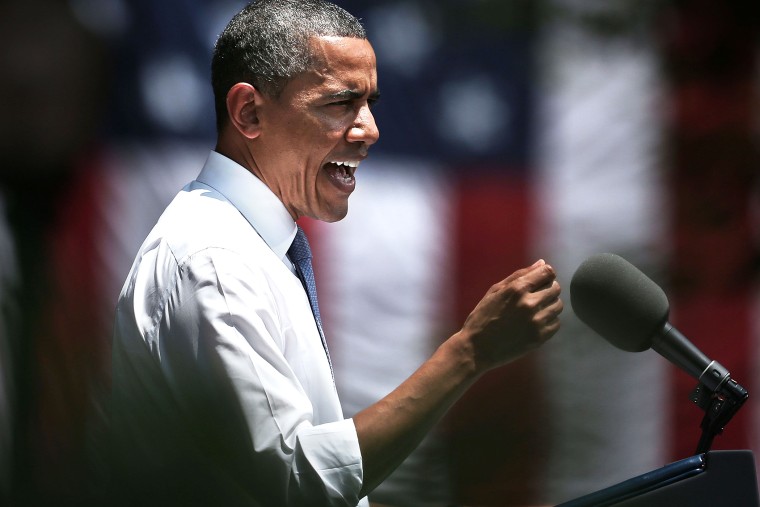President Obama has already
acted more than once to combat the climate crisis through executive action, largely by relying on the Clean Air Act. While the White House acted last year to apply regulatory safeguards to new power plants, this year, Obama unveiled rules that apply to power plants that are already operating, pumping carbon pollution into the environment right now.
To be sure, these policy breakthroughs matter, but given the severity of the global crisis, officials here and around the world realize far more must be done. As Coral Davenport
reported this week, the White House is already eyeing the next step.
The Obama administration is working to forge a sweeping international climate change agreement to compel nations to cut their planet-warming fossil fuel emissions, but without ratification from Congress. In preparation for this agreement, to be signed at a United Nations summit meeting in 2015 in Paris, the negotiators are meeting with diplomats from other countries to broker a deal to commit some of the world's largest economies to enact laws to reduce their carbon pollution.
You'll notice the word "agreement," rather than the word "treaty." That's not an accident.
In theory, U.S. officials
could meet with international leaders and begin negotiations on a new climate treaty to be ratified by participating nations. But foreign policy in the United States has entered a
post-treaty phase -- Republicans won't even allow a vote on a minimum-wage increase, so the idea of getting 67 votes for a climate treaty is plainly ridiculous.
And with this in mind, and facing potentially catastrophic consequences, U.S. officials have had to get creative.
To sidestep that requirement, President Obama's climate negotiators are devising what they call a ''politically binding'' deal that would ''name and shame'' countries into cutting their emissions. The deal is likely to face strong objections from Republicans on Capitol Hill and from poor countries around the world, but negotiators say it may be the only realistic path.''If you want a deal that includes all the major emitters, including the U.S., you cannot realistically pursue a legally binding treaty at this time,'' said Paul Bledsoe, a top climate change official in the Clinton administration who works closely with the Obama White House on international climate change policy.
In practical terms, it means negotiators aren't working on a new international agreement, but rather, they're working on amending an old one. The United Nations Framework Convention on Climate Change,
adopted in 1992 in Rio, established voluntary targets on carbon pollution. The current plan is to revise this existing policy, which would make a ratification vote unnecessary.
Other nations are prepared to go along because there's a growing international understanding that the United States Congress can't be trusted to work on public policy, at least not in any kind of constructive or meaningful way.
''There's a strong understanding of the difficulties of the U.S. situation, and a willingness to work with the U.S. to get out of this impasse,'' Laurence Tubiana, the French ambassador for climate change to the United Nations, told the New York Times. ''There is an implicit understanding that this not require ratification by the Senate.''
It's worth noting that this may not work out. These talks are inherently tricky, include plenty of countries that are reluctant to make sacrifices, and failure is most definitely an option. That said, as Rebecca Leber
added, the fact that such an agreement is under consideration "is further proof that Republican extremism isn't just grinding American politics to a halt and rolling back civil and women's rights: It's imperiling our planet, too."
As for whether the Obama administration has the legal authority to pursue such a policy, Jon Chait
explained this "is not a case of executive overreach" because the United States doesn't "need a formal treaty to coordinate international action."
Exactly what level of commitment requires a formal treaty turns out to be a huge gray area. Daniel Bodansky, a law professor and former State Department climate negotiator, has a paper going through the ins, outs, and what-have-yous. The short answer is that political commitments that lack legal force can work as well, or possibly even better, than binding treaties. [...] Center for American Progress fellow Peter Ogden, the former White House National Security staff director for climate change and environmental policy, points out in Foreign Affairs that the Copenhagen summit, which failed to produce a binding treaty, "was actually a turning point in international climate talks," and has produced significant carbon reductions.
The obvious policy downside -- aside from all the congressional complaining -- is that a long-term climate policy would no doubt be undone the next time there's a Republican president in the White House.
But at this point, given the circumstances, Obama doesn't seem to have much of a choice.
